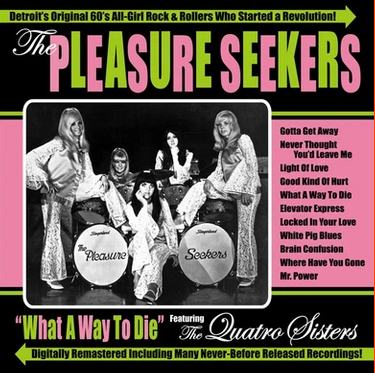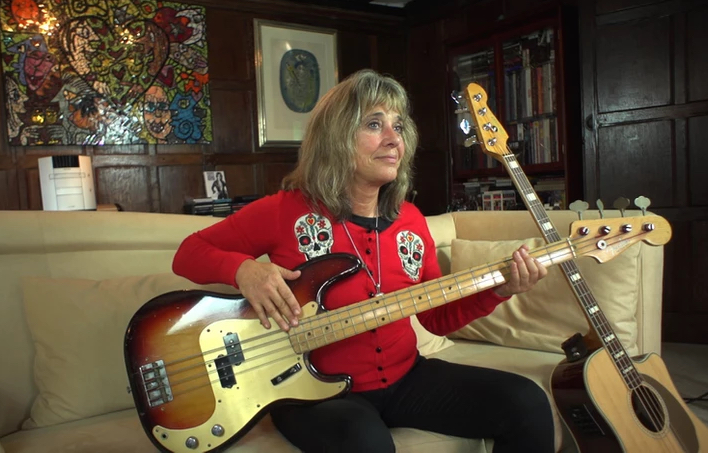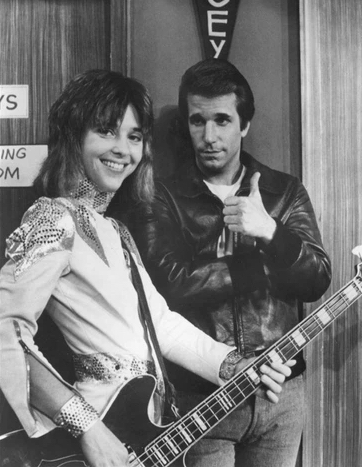Rock docs these days tend to go one of three ways: 1) Behind the Music-style trajectories tracing the rise of a music act we all know and love; 2) redemptive tales that explore challenges and struggles of success or lack thereof; 3) spotlights on influential but largely unknown acts that impacted others but never got their due. Suzi Q, the new documentary from Australian filmmaker Liam Firmager about bassist/singer Suzi Quatro is all three of these and it’s a joy to watch whether you’re a fan or not — which is kind of the whole point.
One of the main intentions of the film — available on Video on Demand services starting this Friday — is giving Suzi Quatro the props she deserves. She was a pioneer on record and on stage, inspiring some legendary ladies in rock music. In America, she is best known not for being a musician, but for playing one on TV. She was already an international hit-maker but it wasn’t until her stint as Leather Tuscadero on Happy Days that she became famous in her own country.

Quatro’s family band The Pleasure Seekers (Courtesy Suzi Quatro)
The film starts with some really cool archival footage highlighting her early days growing up in Detroit. As a teen, she was in an all-girl band called The Pleasure Seekers with her sisters, and they gained some local notoriety. But when a producer sought to pluck Quatro from the family group and make her a solo artist, resentments and sore feelings from her siblings and parents made for a hurtful and lonely start to her career. As the artist tells us in a phone interview from her home in the U.K. before the film’s release, being honest about this part of her story was challenging but essential.
“The family stuff was pretty difficult,” she admits.”In a way it gave me that push to go out to prove something, so in a way I have to thank my family, because I was the horse that nobody bet on and I think nobody wanted me to leave. It wasn’t pleasant but I had to do it and it’s important for people to see what I went through and what hurdles I had to overcome and even just being the one out there doing what I did was hard. All the time i was struggling to make it the the thing I kept thinking was I will not compromise myself, I am me and you will never take that away from me.”
Quatro’s tough gal moxie was a big part of her appeal, not to mention her shag haircut and androgynous glamrock style (and yes, she liked leather even before she started playing the character). But it was her skill on the bass that made her standout, especially due to her small stature. Her mastery of the instrument and her ability to croon powerful rock anthems at the same time was special, and it was particularly novel when she started out because few women were doing it.
“I had discovered my ability to entertain, just being able to play at family gatherings and shows, ” she recalls. “Very early on I realized I had the capacity to entertain people, I felt it in my bones. I just always knew it was my path in life, and it’s amazing to say, 56 years I’ve been on the road.”

At home with her beloved basses. (Courtesy Suzi Quatro)
“I did a lot of tours in America but I didn’t have any hit singles there… something was missing,” she continues, echoing a consistent implication in the film. “Like Debbie [Harry] said in the film, maybe I was too early and that’s very possible. I was so off the wall, back then in America there was never a band led by a girl bass player. I don’t think they were ready for me, but they were ready everywhere else.”
In the doc, Blondie’s Harry is joined by L7’s Donita Sparks, The Go-Go’s Kathy Valentine, The Talking Heads’ Tina Weymoth and the ladies who were inspired by her the most — Lita Ford, Cherie Curie and Joan Jett of The Runaways. Of the three, Jett obviously found the biggest success on her own using the blueprint that Quatro (whose posters she had on her wall as a teen) created. As shown in the doc, Jett emulated her image so veraciously, some fans thought “I Love Rock n’ Roll” was a Quatro release when it first came out. It is suggested that had Quatro emerged during the MTV-era as Jett did, things might have been different in terms of her success in the U.S. and her legacy today (Joan is in the Rock & Roll Hall of Fame, but Suzi is not). Quatro is gracious about how things ended up, though.
“Everybody started somewhere, and you get your inspirations,” says the star. “I paved the way, but I’m proud of her, ya know. She went out and did her own thing. And I would say she was probably my biggest fan. Nobody can take away the fact that I was the first one and I hold onto that.”

Leather and Fonzie. (ABC)
Her videos may not have had a music television platform, but Quatro’s music did a get a lot of exposure via ABC’s Happy Days, on which she performed almost weekly at Arnold’s, the main hangout for the iconic sitcom’s stars including Arthur Fonzarelli (Henry Winkler) and Ritchie Cunningham (Ron Howard). Winkler, along with show creator Gary Marshall, appears in the doc as well, and a case is made for Quatro’s influence on culture even beyond music, her sweet but strong persona providing a marked contrast from the mindless “chicks” who came running every time the Fonz snapped his fingers in earlier seasons.
Though some from the music world thought the show hurt her rock cred at the time, Quatro recognizes the impact her time on Happy Days had on young women, as an audience of future feminists grew up watching her. “It opened the door for women in rock,” says the star matter of factly. “I’ve always been a leather girl too. She was a part of me and [it was] my look, but it was a role. She wasn’t Suzi, but she had elements of me, because if you wanna act you have to put yourself in the part. She was part runaway and part bad girl.”
Post-Happy Days, Quatro did score a hit in the U.S. with the duet “Stumblin In,” but none of her insanely catchy, heavier stuff ever broke the charts in the same way. She went on to do musical theater for several years and she has continued to tour even as recently as last year. She’s currently working on a scripted biopic version of her life story (Miley Cyrus and Billie Eilish have been mentioned as potential stars who could play her), but for now Suzi Q sets the record straight in terms of her trailblazer status, providing an engaging look at her life that should satisfy old fans, win over new ones, and hopefully shake up a new generation of women who love rock & roll.
More info on Suzi Q and where to watch it here.
Advertising disclosure: We may receive compensation for some of the links in our stories. Thank you for supporting LA Weekly and our advertisers.

